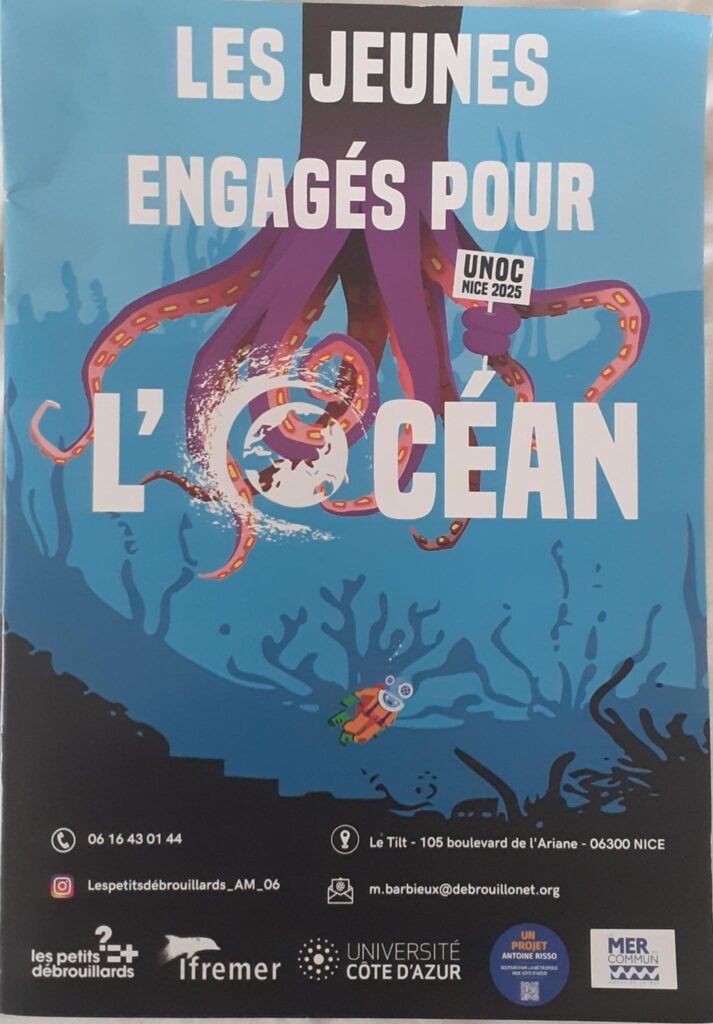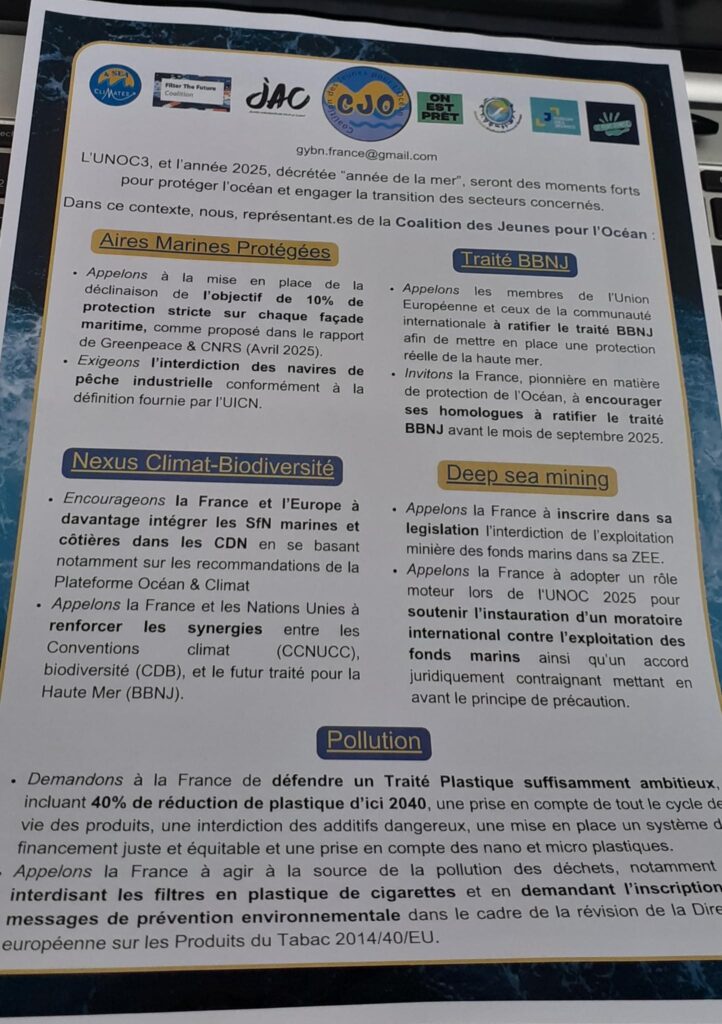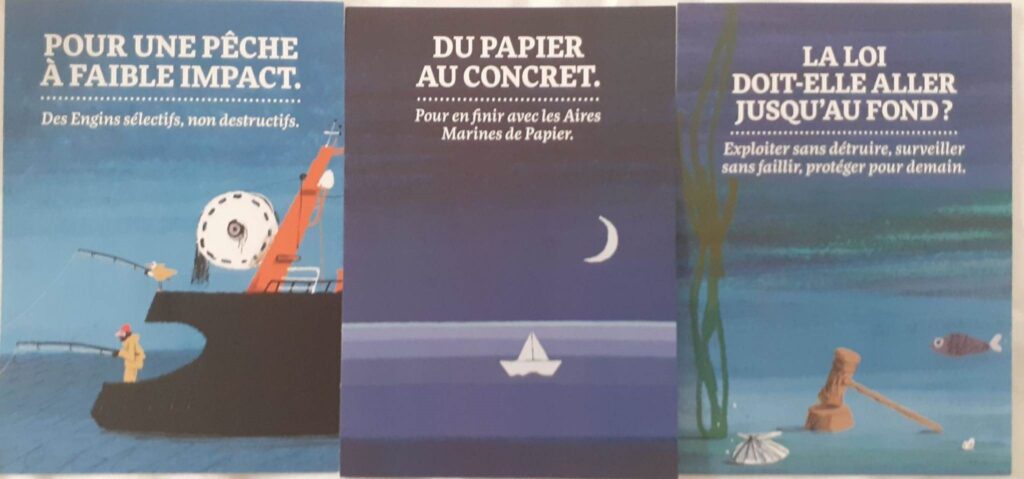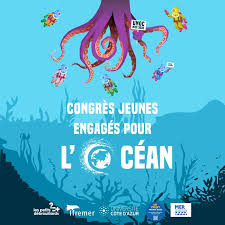Here, we report on three forms of participation, mostly French-speaking, that are part of a series of events held throughout the Summit :
Other youth delegations were present in Nice, includint the ECOPs, the “ePOPers” from IRD-RFI, the Citizens of the Ocean – a programme run by the Nausicaa aquarium (Boulogne-sur-Mer, France), the Office franco-québecois de la jeunesse, the young reporters from the Mohammed VI foundation for the protection of the environment, to name just a few.
Claiming the status of an ‘emerging leader’ on ocean issues and asking for a seat at the negotiation table: “We want to have our seat: it is our main goal. And we want to change the world.” (Member of CEOL)
On Monday, June 9 at noon, in a room at La Baleine, on the upper floor, the event titled “Launch of CEOL – Coalition of Emerging Ocean Leaders: a manifesto for ocean sustainability” is taking place. The event brings together two youth coalitions: CEOL, a newly formed network of youth networks, and representatives of the Citizens of the Ocean initiative (presented in the following section). CEOL is a network of youth networks committed to environmental protection, particularly active around the COPs. During the UNOC, these networks coordinated to organize numerous events. The main demand of this coalition is to have a seat at the negotiation table — that is, a voice in the “blue zone.”
These organizations, which refer to themselves as emerging leaders, are oriented towards international negotiation arenas, are in some cases institutionally recognized, and work continuously through working groups focused on advocacy. This enables them to obtain UN accreditations and observer status at such events. The side events organized by CEOL reflect this focus on the frameworks of international environmental and climate governance. For instance, on Thursday, June 12, another side event is held in the green zone under the theme: “Youth in international negotiations.” The session is conducted in English, and one of the French negotiators of the Nice Ocean Action Plan, from the Ministry for Europe and Foreign Affairs, is invited to share insights and explain the process leading to the political declaration of Nice the following day. Then, various representatives from international youth networks discuss the underrepresentation of young people, despite the formal recognition of their right to be represented, and lament the lack of institutional recognition of their stakeholder status. Several mention having followed other COPs and working on this topic for many years. It appears that there is a form of semi-professionalization among these youth, who are well-acquainted with the framework of international governance and all fluent in English. During the CEOL launch event, a representative from the Ocean Project stated that the newly created coalition aims to make it easier to organize side events “at this kind of parties where everyone wants to go’’.

i CEOL’s side-event, La Baleine, le 12 juin 2025
Focused on the repeated demand to take part in negotiations, these «youth» initiatives carry within them the idea that they represent a legitimate youth, entitled to speak as future «leaders.»
Manifestos with specific and actionable policy demands.
Youth representation takes a second form: that of initiatives led and initiated by various organizations — such as a research institute or an aquarium — in the form of youth conventions. Events organized at UNOC 3 aim to disseminate the proposals emerging from these conventions. The Citizens of the Ocean manifesto is officially presented on June 12, during the symbolic “takeover” of La Baleine by about ten young people who participated in drafting it, and handed over to Minister Agnès Pannier-Runacher[1]. Nausicaá, the aquarium in Boulogne-sur-Mer, has supported these young people since the fall of 2024 and backed the creation of what is called the Coalition of 200 Youth for the Ocean. The Young People Committed to the Ocean [Manifeste des Jeunes engagés pour l’Océan] manifesto is shared in the form of an exhibition and also delivered to government representatives. Similarly, it was co-developed over several weeks, notably during three days in Nice organized by Ifremer and Les Petits Débrouillards. The coordinators of this initiative emphasize their intention to bring together youth from diverse backgrounds but with prior interest in ocean protection, allowing them to learn from one another and produce concrete proposals. As a result, the proposals presented are precise and mainly take the form of specific demands — for instance, the need for an international definition of marine protected areas — reflecting extensive advocacy work carried out beforehand.
 |
 |
Clara Gervaise-Volaire
ii Two examples of manifestos written by young people, containing proposals on ocean governance: the Manifeste des Jeunes engagés pour l’Océan and the Manifeste de la Coalition des Jeunes pour l’Océan, both distributed on June 12, 2025

iii Three of the fifteen proposals, presented in the form of posters as part of «Cette exposition doit faire des vagues«, echo the themes of the UNOC panels [2]
Young scientists: representing a National Priority Research Program at the UN Summit.
Finally, several members of the ODIPE project benefit from funding through the Priority Research Program (PPR) Océan & Climat [3], co-led by the CNRS and Ifremer and took part in a collective endeavor. A manifesto, limited to two pages at the suggestion of the PPR directors, was drafted starting in January 2025 and validated by the program’s scientific management. On June 12, for Youth Day, Ifremer organized several events aboard the Thalassa, a vessel in the oceanographic fleet operated by Ifremer. On this occasion, the PPR leadership invited the doctoral students who authored the manifesto to present it during an official moment, in the presence of the CEOs of Ifremer, the IRD, and Les Petits Débrouillards. After a tour of the Thalassa with other delegations — showcasing life on board and science communication tools developed by Les Petits Débrouillards in collaboration with Ifremer — the official event took place on the ship’s deck. The speech by the three doctoral student representatives was scheduled to last three minutes and followed those presenting the Nausicaá, Jeunes engagés pour l’océan, and ePOP manifestos. At the same time, an “institutional spotlight” on the manifesto was planned across the websites of IFREMER, CNRS, and the online media Océans connectés. During the writing process, the group was asked to avoid direct accusations, but still adopted a rather radical tone, questioning the role of scientific knowledge production and asserting (in French): “The main issue in confronting environmental crises is no longer a lack of scientific knowledge, but rather the invisibilization, if not denial, of that knowledge.” They concluded by noting that: “A priority research program only makes sense if decision-makers are also ready to take up its challenges. We are ready to support them: it is time to change course.” An abridged version of the manifesto was read at the event, in a more solemn tone than the previous presentations.
Political receptions: celebrating engagement, sidelining demands
As the author of this piece observed firsthand while participating in a program aimed at promoting youth involvement at UNOC (from which she benefited), “engaged youth” is a heterogeneous category. It includes young people (under 30 or 35, depending on the initiative) with a broad range of occupations: some are developing marine geoengineering start-ups, volunteering with anti-plastic organizations, or pursuing PhDs in marine biology. This raises questions about the socio-economic biases embedded in the invocation of “youth”. It is well established that the youth mobilized in these international arenas, due to the material constraints of participation, largely come from academic networks.
The invocation of youth as the “future generation” is a constant refrain in speeches by political and diplomatic leaders at these events, along with the affirmation that youth have a rightful place in such forums. Jonathan Delance, representative of the Dominican Republic to the UN, opened the CEOL launch session by expressing curiosity about what the young leaders are doing for the ocean. He emphasized that such initiatives are more about “the future we can build together as citizens of this Earth, and as this generation is going to bring the most change to this world.” When Thibaut de Saint Pol, the French Interministerial Delegate for Youth, met with youth delegations, he praised their role in inspiring others and broadening young people’s horizons. He was particularly enthusiastic about a session between a youth delegation and a group of very young children (6 years old), congratulating the youth representatives for being a role model for the youngest audiences. He highlighted the benefits in terms of professional networking and the creation of market opportunities for the young entrepreneurs involved. At the event aboard the Thalassa, he stated that his mission is to “respond to this need for youth engagement” and to address “the widespread eco-anxiety among young people.”
While “youth” are indeed invited to participate in UNOC3, it often appears to be in a manner that legitimizes existing narratives about their engagement, rather than in a true space of political co-construction. The concrete proposals emerging from youth conventions, and the statements by young scientists, go uncommented. Despite the discourse, youth are mobilized more as symbols of hope than as co-decision-makers. Despite discourses, youth are mobilized as symbols of hope, not as co-decision-makers. The rhetorical function of youth platforms seems to have become a standard fixture, with their critical dimension often easily sidelined.
[1] https://www.nausicaa.fr/fr/le-mag-ocean/prise-de-la-baleine-par-la-jeunesse
[2] The full manifesto can be found there : https://www.ifremer.fr/sites/default/files/2025-06/cp_les_15_mesures_des_jeo_13062025.pdf
[3] A PPR, or Programme Prioritaire de Recherche (Priority Research Program), is a mechanism established by the French government to structure, strengthen, and coordinate research on major strategic issues. Announced by Emmanuel Macron at the Assises de l’Économie de la Mer in Montpellier in 2019, the PPR Océan & Climat was launched in June 2021 and runs until 2027, with a budget of €40 million allocated over six years. Program website: https://www.ocean-climat.fr/Le-PPR In addition to large-scale research projects, the PPR also funds doctoral and post-doctoral fellowships.

Share